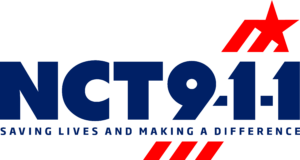Who We Are
The North Central Texas Emergency Communications District (NCT9-1-1) is made up of over 40 Emergency Communications Centers (ECCs) in 14 counties surrounding the Dallas/Fort Worth Metroplex. Current openings for 9-1-1 telecommunicators and dispatchers within our ECCs are listed below.
Benefits of the Career
Why Choose a Career in 9-1-1?
As a 9-1-1 telecommunicator, you are the lifeline for your community. Here’s what you can expect when you join a career in 9-1-1:
- Make an Impact: Be the voice that helps people through their most challenging moments.
- Career Growth Opportunities: Advance into leadership roles or specialize in areas like training, quality assurance, or management.
- Competitive Compensation: Enjoy a rewarding salary, excellent benefits, and job stability.
- Work-Life Balance: Flexible schedules and paid time off allow you to recharge.
- Training Provided: No experience? No problem. Your hiring agency will provide all of the training needed for success.
- Education and Experience: High School Diploma or equivalent with no prior relevant work experience.
The Difference Between 9-1-1 Telecommunicators and Dispatchers
A 9-1-1 telecommunicator, or 9-1-1 call taker, is an emergency response coordination professional trained to receive, assess, and prioritize emergency requests for assistance, including, but not limited to:
- Determining the location of the emergency being reported
- Determining the appropriate law enforcement, fire, emergency medical, or combination of those emergency services to respond to the emergency
- Coordinating the implementation of that emergency response to the location of the emergency
- Processing requests for assistance from emergency responders.
A dispatcher is a 9-1-1 telecommunicator who prioritizes and directs the specific response of multiple public safety resources (e.g., fire, police, EMS) to emergency incidents by prioritizing vital information and maintaining situational awareness of all circumstances for the incident that impacts the safety of field responders. A dispatcher exercises independent judgment to determine the type and level of response necessary, coordinates essential emergency instructions to all parties in the incidents using radios, computers, and other public safety networks, and ensures alert coordination with other agencies (hospitals, air rescue, hazmat teams, etc.) is maintained to provide emergency response and transport that maximizes life safety and public law and order.
Day in the Life
Every day is different, but here’s what you can expect when you choose a career in 9-1-1:
- Call Handling: Take emergency calls and guide people with calm, clear instructions.
- Problem Solving: Coordinate resources and provide life-saving guidance.
- Teamwork: Work alongside a supportive team dedicated to making a difference.
- Community Impact: End each shift knowing you’ve made a meaningful contribution.
Your Future Starts Here
A career in 9-1-1 is just the beginning. Here’s where it can lead:
- Training Coordinator
- Quality Assurance Specialist
- Supervisory or Management Roles
- Specialized Fields (e.g., GIS, IT support for 9-1-1 systems)
Start your journey as a 9-1-1 telecommunicator or dispatcher today. Your community needs you, and your career is waiting!
Below are links to the direct hiring pages for the Emergency Communications Centers (ECCs) within the NCT9-1-1 service area. Please note that positions for 9-1-1 telecommunicators or dispatchers may also be listed under titles like ‘Communications Specialist,’ ‘Police Telecommunicator,’ or ‘Communications Officer,’ depending on the agency.
If you have any questions about the hiring process, please contact the NCT9-1-1 Operations Team at 911OpsTeam@nct911.org.













